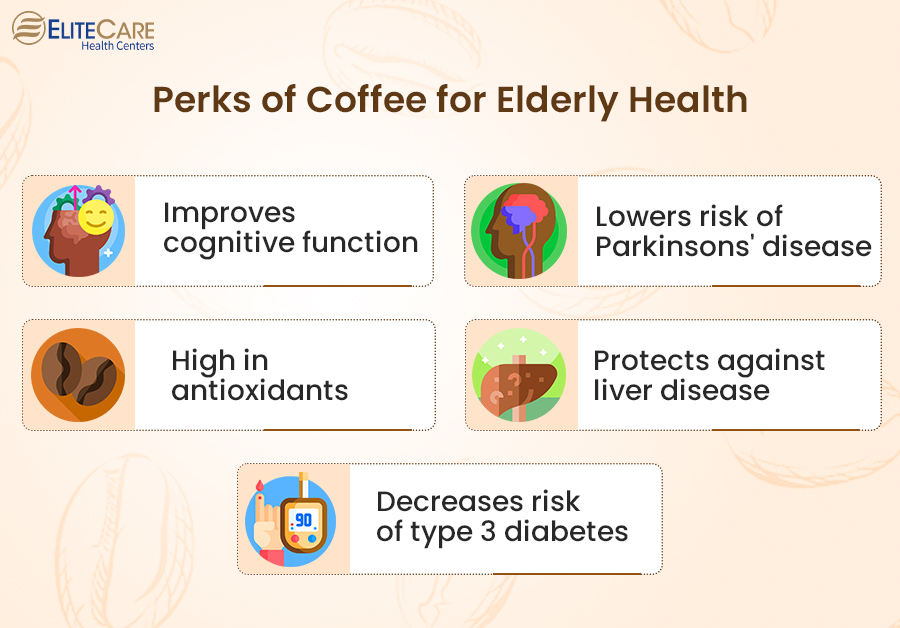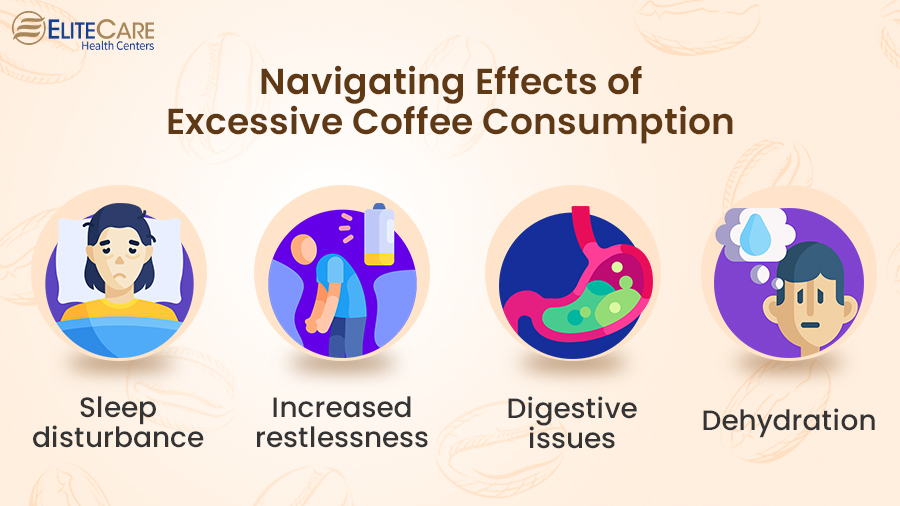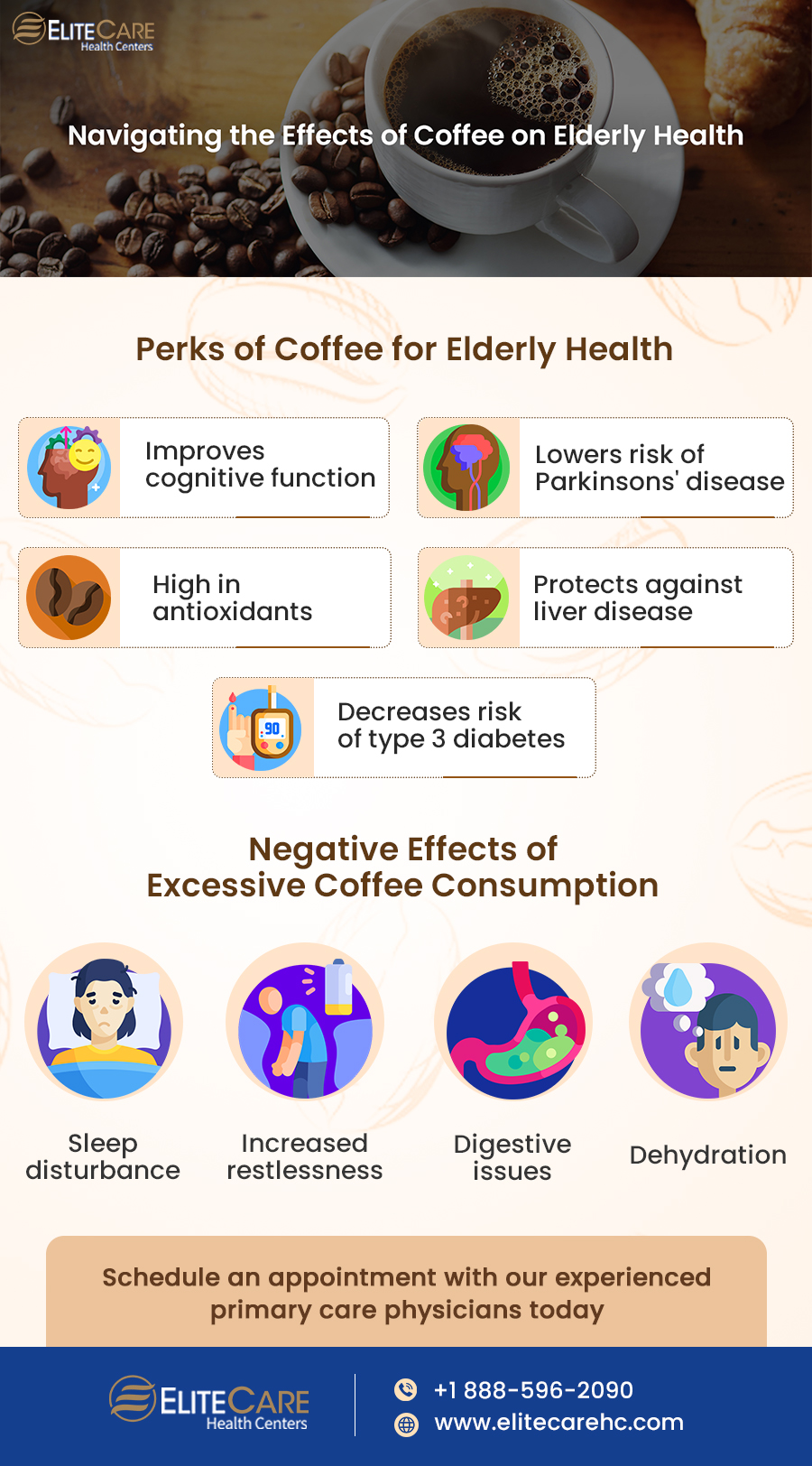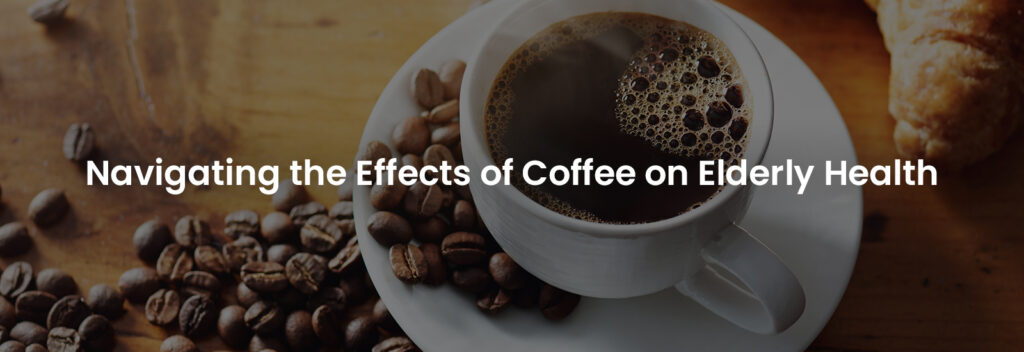
Coffee is one of the most popular beverages worldwide, and its consumption extends to people of all age groups. Coffee is prevalent in daily routines among older adults, providing both enjoyment and a pick-me-up. However, there has been an ongoing debate regarding coffee’s effects on seniors’ health. As a health and wellness center dedicated to the well-being of seniors, it is essential to address the impact of coffee consumption on their health and provide evidence-based insights.
This blog post will shed light on coffee consumption’s potential benefits and risks for older adults.
The Perks of Coffee for Elderly Health

a) Cognitive function
Studies suggest that coffee may positively impact cognitive function in older adults. The benefits of coffee are that – caffeine in coffee is a stimulant that can enhance alertness, concentration, and mental performance. Moderate coffee consumption has been linked to a reduced risk of cognitive decline, including conditions like dementia and Alzheimer’s disease.
b) Antioxidant powerhouse
Coffee is a rich source of antioxidants, such as polyphenols and chlorogenic acids. These compounds help combat oxidative stress associated with aging and chronic diseases. Antioxidants in coffee protect against cellular damage and contribute to overall health.
c) Disease prevention
Some research indicates that coffee consumption may reduce the risk of certain age-related conditions. For instance:
- Parkinson’s disease: Regular coffee consumption has been associated with a lower risk of Parkinson’s disease, a neurodegenerative disorder that affects movement.
- Type 2 diabetes: Moderate coffee consumption has shown potential in reducing the risk of developing type 2 diabetes, a condition that becomes more prevalent with age.
- Liver health: According to a study, coffee consumption is associated with a 35% decreased risk of liver fibrosis and non-alcoholic fatty liver disease.
Caffeine and Its Impact on Seniors
While coffee offers potential health benefits, it’s important to address concerns related to caffeine sensitivity in older adults. With age, the sensitivity to caffeine may increase due to changes in metabolism and the body’s ability to process caffeine. Older adults may experience increased heart rate, restlessness, and digestive discomfort. Monitoring caffeine intake to avoid adverse reactions and promote optimal health and well-being is crucial.
Navigating Effects of Excessive Caffeine Consumption

Excessive caffeine consumption in seniors can lead to various negative effects on health and well-being, such as:
1. Sleep disturbances
Caffeine is a stimulant that can interfere with sleep. Seniors who consume excessive amounts of caffeine, especially later in the day, may experience difficulties falling asleep or maintaining quality sleep. This can lead to daytime sleepiness, fatigue, and overall sleep disturbances.
2. Increased anxiety and restlessness
Caffeine can worsen anxiety and restlessness, particularly in individuals more sensitive to its effects. Seniors may experience heightened levels of anxiety, nervousness, and restlessness.
3. Dehydration
Caffeine is known to have diuretic effects, which can increase urine production and contribute to dehydration. Seniors, who may already be at a higher risk of dehydration, should be mindful of their overall fluid intake and balance coffee consumption with adequate hydration.
4. Digestive issues
Excessive caffeine consumption can lead to digestive discomfort, including acid reflux, heartburn, and increased bowel movements. Seniors prone to gastrointestinal issues or have sensitive digestive systems should be mindful of their caffeine intake to prevent or minimize such problems.
To ensure seniors’ well-being, it is advisable to moderate caffeine consumption and be mindful of individual tolerance levels. Consulting with healthcare clinic professionals, such as those at our health and wellness center or medical clinic, can provide personalized guidance on caffeine intake and help manage any potential risks associated with excessive consumption.
Managing Coffee Consumption in Older Adults
a) Limit daily intake: It is generally recommended that older adults consume no more than 50-100 mg of caffeine or 5-10 g of coffee powder daily. Sticking to this limit helps minimize the potential negative effects of excessive caffeine consumption.
b) Morning preference: Consuming coffee earlier in the day is advisable to allow sufficient time for the body to metabolize caffeine. This can help prevent interference with sleep patterns and promote better sleep quality.
c) Monitor individual tolerance: Some older adults may be more sensitive to caffeine effects and may need to reduce their intake further to avoid adverse reactions.
Alternative Options for Caffeine Sensitivity
For seniors who are sensitive to caffeine or wish to reduce their intake, there are alternative options to enjoy flavorful beverages as follows:
a) Herbal teas
Herbal teas, such as chamomile, peppermint, or rooibos, provide a caffeine-free alternative with various health benefits. These teas can be enjoyed hot or cold, providing a soothing and refreshing experience.
b) Decaffeinated coffee
Opting for decaffeinated coffee allows seniors to enjoy the taste and aroma of coffee without the stimulating effects of caffeine. Decaffeinated options are widely available and can be a suitable alternative for reducing caffeine intake.
c) Infused water
Infusing water with fruits, herbs, or vegetables can create refreshing and flavorful beverages without caffeine. Citrus fruits, berries, cucumber, and mint are popular for creating naturally infused water.
Seniors can make informed decisions regarding coffee consumption by considering individual health conditions, medication interactions, and personal preferences. Our healthcare clinic and senior care services offer guidance and support to help individuals navigate their specific needs and maintain a balanced and healthy lifestyle.
Remember, the advice of healthcare professionals be it at medical clinic or online doctor consultation. As it is essential in managing coffee consumption and ensuring the well-being of older adults.
Myths and Misconceptions Surrounding Coffee Consumption
1. Myth: Coffee weakens bone health in older adults.
The misconception is that coffee consumption can weaken bones and lead to osteoporosis. However, scientific studies suggest that moderate coffee consumption does not have a significant negative impact on bone health in older adults. Factors such as adequate calcium and vitamin D intake and a healthy lifestyle play a more crucial role in maintaining strong bones.
2. Myth: Coffee causes dehydration
Moderate coffee consumption does not lead to dehydration, especially when individuals maintain a balanced daily fluid intake.
3. Myth: Coffee is harmful to heart health in older adults
In moderation, coffee consumption has not been consistently associated with an increased risk of cardiovascular disease in older adults. Some studies have shown that moderate coffee consumption may reduce the risk of certain heart conditions. However, it is essential to consider individual health conditions and consult healthcare professionals for advice.
It is important to rely on scientific evidence and studies to dispel these myths and misconceptions surrounding coffee consumption in older adults.
To Sum Up
Maintaining a balanced approach to coffee consumption and embracing a healthy lifestyle is key. While coffee offers potential health benefits, it is important to be mindful of individual health conditions, medication interactions, and personal tolerance to caffeine. By following the recommendations for safe and moderate coffee intake, seniors can continue to enjoy their coffee while minimizing potential risks.
At EliteCare Health Center, we understand the unique healthcare needs of seniors. Our comprehensive senior care services, including annual and routine physical exams, aim to promote overall well-being and address individual health concerns.
Contact us today to schedule an appointment with our experienced primary care physician specializing in senior care services. Together, we can navigate the complexities of seniors’ health and empower them to make informed decisions for their well-being.






